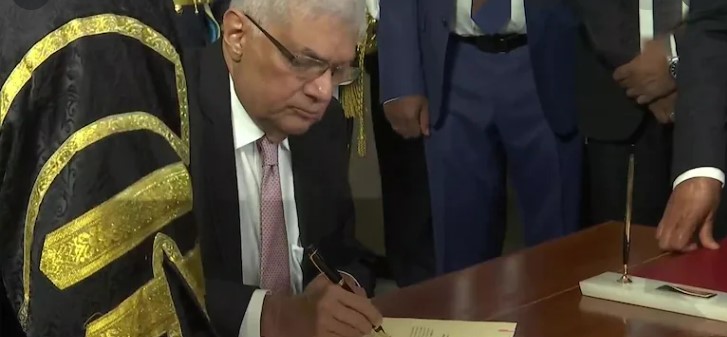Virendra Pandit
New Delhi: Six-time former Prime Minister Ranil Wickremesinghe was on Thursday sworn-in as Sri Lanka’s 8th Executive President, until November 2024, amid protests against his unprecedented “election” not by the people but by Parliament.
The protesters opposed his presidency as a proxy of his predecessor, the ousted and fugitive Gotabaya Rajapaksa, whose family-run outfit, Sri Lanka Podujana Peramuna (SLPP), supported Wickremesinghe’s latest appointment.
Hundreds of protesters gathered near Parliament after Wickremesinghe took the oath as President to express their outrage as they see him as part of the problematic political establishment left by the highly unpopular Rajapaksa dynasty.
A Cabinet of 20-25 members will be appointed within a few days to serve under President Wickremesinghe, the Daily Mirror newspaper reported.
Wickremesinghe, 73, took the oath of office before Chief Justice Jayantha Jayasuriya at the Parliament Complex. He will face the tough task of leading the bankrupt country out of its unprecedented economic crisis and restoring order after months of mass protests.
In his long political career, Wickremesinghe had unsuccessfully fought elections twice for the presidency. He has the unique distinction of being the successor to ousted Prime Minister Mahinda Rajapaksa and his brother President Gotabaya. Within three months, he replaced both the brothers and was being denounced as their proxy.
Last week, Wickremesinghe, then the Prime Minister, had taken over as the Acting President after the incumbent Gotabaya Rajapksa fled Sri Lanka and resigned. He is the first Sri Lankan President to be elected by Parliament following a vote of lawmakers on Wednesday in a rare move that could provide continuity for crucial discussions with the International Monetary Fund (IMF) for a bailout deal for the cash-strapped island nation.
Earlier, the media reported that late D B Wijetunga was elected uncontested in May 1993 after the incumbent President R Premadasa’s demise.
Wickremesinghe secured 134 votes in the 225-member House, while his nearest rival and dissident ruling party leader Dullas Alahapperuma got 82. Leftist Janatha Vimukthi Peramuna leader Anura Kumara Dissanayaka secured just three votes during the voting held in Parliament amidst tight security.
Wickremesinghe’s comfortable victory with the backing of the Rajapaksa dynasty’s outfit SLPP party showed the family’s continued firm grip on Sri Lankan politics despite the resignations of President Gotabaya, former prime minister Mahinda and former finance minister Basil Rajapaksa in recent weeks in the face of massive anti-government protests.
Wickremesinghe’s victory could again inflame the situation as many anti-government protesters see him as inextricably tied to the erstwhile Rajapaksa regime, blamed for the country’s worst financial meltdown since independence from the British in 1948.
Wickremesinghe will have a mandate to serve the remaining term of Gotabaya Rajapaksa, which will end in November 2024.

